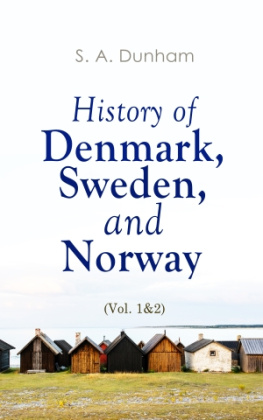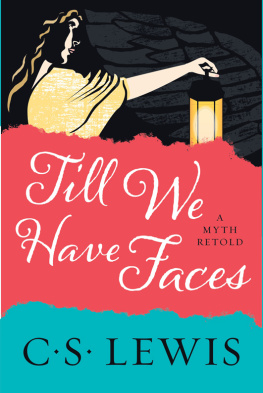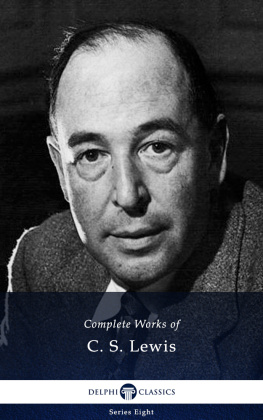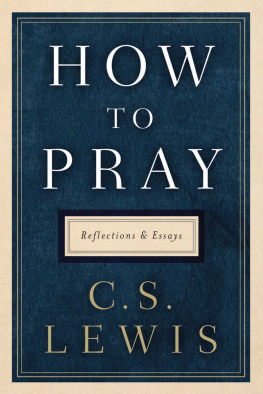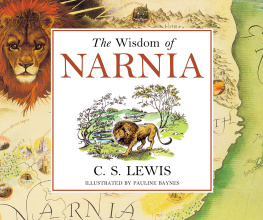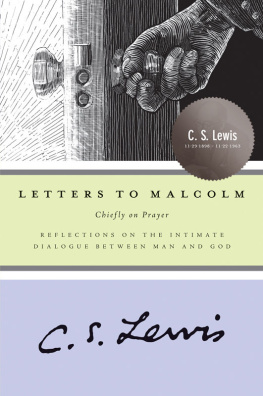C. S. Lewis
The Complete Works of C. S. Lewis
e-artnow, 2016
Contact:
ISBN 978-80-268-5185-1
Novels
Space Trilogy
Out of the Silent Planet
Chapter One
The last drops of the thundershower had hardly ceased falling when the Pedestrian stuffed his map into his pocket, settled his pack more comfortably on his tired shoulders, and stepped out from the shelter of a large chestnut-tree into the middle of the road. A violent yellow sunset was pouring through a rift in the clouds to westward, but straight ahead over the hills the sky was the colour of dark slate. Every tree and blade of grass was dripping, and the road shone like a river. The Pedestrian wasted no time on the landscape but set out at once with the determined stride of a good walker who has lately realized that he will have to walk farther than he intended. That, indeed, was his situation. If he had chosen to look back, which he did not, he could have seen the spire of Much Nadderby, and, seeing it, might have uttered a malediction on the inhospitable little hotel which, though obviously empty, had refused him a bed. The place had changed hands since he last went for a walking-tour in these parts. The kindly old landlord on whom he had reckoned had been replaced by someone whom the barmaid referred to as the lady, and the lady was apparently a British innkeeper of that orthodox school who regard guests as a nuisance. His only chance now was Sterk, on the far side of the hills, and a good six miles away. The map marked an inn at Sterk. The Pedestrian was too experienced to build any very sanguine hopes on this, but there seemed nothing else within range.
He walked fairly fast, and doggedly, without looking much about him, like a man trying to shorten the way with some interesting train of thought. He was tall, but a little round-shouldered, about thirty-five to forty years of age, and dressed with that particular kind of shabbiness which marks a member of the intelligentsia on a holiday. He might easily have been mistaken for a doctor or a schoolmaster at first sight, though he had not the man-of-the-world air of the one or the indefinable breeziness of the other. In fact, he was a philologist, and fellow of a Cambridge college. His name was Ransom.
He had hoped when he left Nadderby that he might find a nights lodging at some friendly farm before he had walked as far as Sterk. But the land this side of the hills seemed almost uninhabited. It was a desolate, featureless sort of country mainly devoted to cabbage and turnip, with poor hedges and few trees. It attracted no visitors like the richer country south of Nadderby and it was protected by the hills from the industrial areas beyond Sterk. As the evening drew in and the noise of the birds came to an end it grew more silent than an English landscape usually is. The noise of his own feet on the metalled road became irritating.
He had walked thus for a matter of two miles when he became aware of a light ahead. He was close under the hills by now and it was nearly dark, so that he still cherished hopes of a substantial farmhouse until he was quite close to the real origin of the light, which proved to be a very small cottage of ugly nineteenth-century brick. A woman darted out of the open doorway as he approached it and almost collided with him.
I beg your pardon, sir, she said. I thought it was my Harry.
Ransom asked her if there was any place nearer than Sterk where he might possibly get a bed.
No, sir, said the woman. Not nearer than Sterk. I dare say as they might fix you up at Nadderby.
She spoke in a humbly fretful voice as if her mind were intent on something else. Ransom explained that he had already tried Nadderby.
Then I dont know, Im sure, sir, she replied. There isnt hardly any house before Sterk, not what you want. Theres only The Rise, where my Harry works, and I thought you was coming from that way, sir, and thats why I come out when I heard you, thinking it might be him. He ought to be home this long time.
The Rise, said Ransom. Whats that? A farm? Would they put me up?
Oh no, sir. You see theres no one there now except the Professor and the gentleman from London, not since Miss Alice died. They wouldnt do anything like that, sir. They dont even keep any servants, except my Harry for doing the furnace like, and hes not in the house.
Whats this professors name? asked Ransom, with a faint hope.
I dont know, Im sure, sir, said the woman. The other gentlemans Mr. Devine, he is, and Harry says the other gentleman is a professor. He dont know much about it, you see, sir, being a little simple, and thats why I dont like him coming home so late, and they said theyd always send him home at six oclock. It isnt as if he didnt do a good days work either.
The monotonous voice and the limited range of the womans vocabulary did not express much emotion, but Ransom was standing sufficiently near to perceive that she was trembling and nearly crying. It occurred to him that he ought to call on the mysterious professor and ask for the boy to be sent home: and it occurred to him just a fraction of a second later that once he were inside the houseamong men of his own professionhe might very reasonably accept the offer of a nights hospitality. Whatever the process of thought may have been, he found that the mental picture of himself calling at The Rise had assumed all the solidity of a thing determined upon. He told the woman what he intended to do.
Thank you very much, sir, Im sure, she said. And if you would be so kind as to see him out of the gate and on the road before you leave, if you see what I mean, sir. Hes that frightened of the Professor and he wouldnt come away once your back was turned, sir, not if they hadnt sent him home themselves like.
Ransom reassured the woman as well as he could and bade her good-bye, after ascertaining that he would find The Rise on his left in about five minutes. Stiffness had grown upon him while he was standing still, and he proceeded slowly and painfully on his way.
There was no sign of any lights on the left of the roadnothing but the flat fields and a mass of darkness which he took to be a copse. It seemed more than five minutes before he reached it and found that he had been mistaken. It was divided from the road by a good hedge and in the hedge was a white gate: and the trees which rose above him as he examined the gate were not the first line of a copse but only a belt, and the sky showed through them. He felt quite sure now that this must be the gate of The Rise and that these trees surrounded a house and garden. He tried the gate and found it locked. He stood for a moment undecided, discouraged by the silence and the growing darkness. His first inclination, tired as he felt, was to continue his journey to Sterk: but he had committed himself to a troublesome duty on behalf of the old woman. He knew that it would be possible, if one really wanted, to force a way through the hedge. He did not want to. A nice fool he would look, blundering in upon some retired eccentricthe sort of a man who kept his gates locked in the countrywith this silly story of a hysterical mother in tears because her idiot boy had been kept half an hour late at his work! Yet it was perfectly clear that he would have to get in, and since one cannot crawl through a hedge with a pack on, he slipped his pack off and flung it over the gate. The moment he had done so, it seemed to him that he had not till now fully made up his mindnow that he must break into the garden if only in order to recover the pack. He became very angry with the woman, and with himself, but he got down on his hands and knees and began to worm his way into the hedge.
The operation proved more difficult than he had expected and it was several minutes before he stood up in the wet darkness on the inner side of the hedge smarting from his contact with thorns and nettles. He groped his way to the gate, picked up his pack, and then for the first time turned to take stock of his surroundings. It was lighter on the drive than it had been under the trees and he had no difficulty in making out a large stone house divided from him by a width of untidy and neglected lawn. The drive branched into two a little way ahead of himthe right-hand path leading in a gentle sweep to the front door, while the left ran straight ahead, doubtless to the back premises of the house. He noticed that this path was churned up into deep rutsnow full of wateras if it were used to carrying a traffic of heavy lorries. The other, on which he now began to approach the house, was overgrown with moss. The house itself showed no light: some of the windows were shuttered, some gaped blank without shutter or curtain, but all were lifeless and inhospitable. The only sign of occupation was a column of smoke that rose from behind the house with a density which suggested the chimney of a factory, or at least of a laundry, rather than that of a kitchen. The Rise was clearly the last place in the world where a stranger was likely to be asked to stay the night, and Ransom, who had already wasted some time in exploring it, would certainly have turned away if he had not been bound by his unfortunate promise to the old woman.

